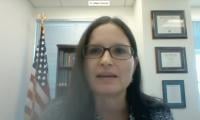Pink October
In October, many people around the world wear pink ribbons to raise awareness about breast cancer. The month is referred to as Pink-October. With every passing year there is more activity during October in Pakistan as well and the cause has found a new champion. Begum Samina Arif Alvi, the first lady of Pakistan, is working tirelessly to generate awareness and action on breast cancer.
Breast cancer is the most common cancer in the world. It is estimated that one in every 10 women will develop breast cancer; this is an extremely high and disturbing probability. Out of a total of 2.1 million women in the world who develop breast cancer in a year, 630,000 will succumb to it. Survival rate in late stage breast cancer is low.
In Pakistan also, it is the most common cancer among women. A closer look reveals, according to a study published by Aga Khan University in 2016, that if 100 women had malignant tumors in Pakistan, 32 of them had breast cancer. In the case of men, oral cavity cancer was found among 14 out of 100. This shows the difference between the scale of top cancers among men and women.
It has been calculated that in Pakistan a woman is diagnosed with breast cancer approximately every 13 minutes, resulting in more than 40,000 diagnoses in a year. According to the statistics provided by the Shaukat Khanum Memorial Cancer Hospital and Research Centre (SKMCHRC), 22 percent of all the cancers seen in the hospital are breast cancers.
What causes breast cancer is not clearly understood. Genetics plays an important role. The daughter of a mother who had breast cancer is more vulnerable than a woman with no such family history. Development of signs and symptoms at an early age, early menarche, obesity are other risk factors for breast cancer. The key to prevent breast cancer hence is an early diagnosis.
On the positive side, there are some factors which provide relative protection from breast cancer. Women who breastfeed their children for more than two years, women who have more pregnancies and women who have first pregnancy at a younger age are relatively less likely to develop breast cancer. Breastfeeding is especially important as it also provides natural contraception during the period.
Oncologists divide breast cancer into five stages (stage 0 to stage IV) and the prognosis depends on the stage at which the cancer is diagnosed. The lower the stage, better the prognosis. Stage 0 is benign (non-cancerous) and in stage IV the cancer spreads beyond the breast. This stage is also called advanced breast cancer which is metastatic (spread of cancer cells to other parts of the body than from where it originated).
If diagnosed at stage 0, recovery is 100 percent. Recovery at stage I is 98 percent, at stage II it is 88 percent, at stage III 52 percent but once it is stage IV the chances of survival reduce to only 16 percent.
Staging is a complex process involving TNM system, grading system and biomarker status. The TNM system is used to describe the size of the primary tumor, the spread of cancer to nearby lymph nodes and spread to other parts of the body. The tumor grading system is used to describe how quickly a breast tumor is likely to grow and spread, and determining biomarker status means testing to find out whether breast cancer cells have certain receptors.
The most important factor in preventing breast cancer is by diagnosing it at as early a stage as possible and the key to it is a regular breast self-examination by women above the age of 20 and reporting to a health professional on finding any abnormality. A yearly mammogram is recommended among women above the age of 40 years to screen any early signs of breast cancer which are not evident on self-examination. Currently, no such national screening program exists in Pakistan. Private labs charge between Rs5000 and Rs6000, which obviously is not affordable for the majority of our women. Almost all high-income countries and increasingly middle-income countries are introducing national screening programs.
Women need to know about their vulnerability to develop breast cancer. For some years now, awareness raising activities for breast cancer have been on the rise in Pakistan. An evidence for this, according to SKMCHRC data, is that in 2003, 48 percent women were presenting with Stages 0, I and II as compared to 77 percent women in 2019. Notwithstanding this trend, there are major socio-cultural barriers like shyness and stigma, due to which women don’t timely report abnormalities to their families and doctors. It is common to see advanced breast cancer being reported for the first time to a doctor when not much can be done except providing palliative therapy.
Once diagnosed, then depending upon the stage and other factors any combination of surgery, chemotherapy, hormonal therapy, biological therapy and radiation therapy are employed with varying degrees of success. New cancer medicines, especially monocolonal antibodies, are proving relatively effective but because of extremely high prices the treatment is unaffordable to the majority of families in Pakistan. A new deal is needed to be made between the multinational companies producing these medicines and developing country governments. Along with that, local research and development needs to be incentivised in this area.
Men can also have breast cancer; though rare, the trend is growing. Another escalating trend is that breast cancer, contrary to a common belief, is becoming more and more common among young women.
October this year was full of awareness raising activities in the country, starting with an event held in the Presidency on October 1 to mark the beginning of the month. The first lady has gone to all major cities herself, led awareness raising marches of parliamentarians, forged new partnerships, facilitated the beginning of the establishment of a national registry for breast cancer (a very important step) and a call centre. Many breast cancer survivors in Pakistan have also started contributing to awareness raising campaigns. Many private labs reduced the prices of mammograms to 50 percent.
Pakistan has a long way to go in effectively addressing the growing breast cancer and the October momentum needs to be carried all year around.
The writer is former special assistant to the PM for health.
Email: zfmrza@yahoo.com
-
 US Judge Aileen Cannon Issues Permanent Order In Trump Documents Case
US Judge Aileen Cannon Issues Permanent Order In Trump Documents Case -
 King Charles, Royals Are Not ‘bright’ Enough To Live In Mansions
King Charles, Royals Are Not ‘bright’ Enough To Live In Mansions -
 'Final Throw Of The Dice': Paramount Submits Highest Bid Offer To Warner Bros. In Last Round
'Final Throw Of The Dice': Paramount Submits Highest Bid Offer To Warner Bros. In Last Round -
 China Rolls Out New AI-powered 'DeepRare' Technology For Efficient Medical Diagnosis
China Rolls Out New AI-powered 'DeepRare' Technology For Efficient Medical Diagnosis -
 Kim Kardashian Says She Misses Her Dad Robert Kardashian 'every Day' In Heartfelt Post
Kim Kardashian Says She Misses Her Dad Robert Kardashian 'every Day' In Heartfelt Post -
 Chris Hemsworth Gets Candid About Daughter’s Drawings That Inspired Several Of His Tattoos
Chris Hemsworth Gets Candid About Daughter’s Drawings That Inspired Several Of His Tattoos -
 UK To Experience Rare 'Blood Rain' On Tuesday Feb. 24, 2026: Know Every Detail
UK To Experience Rare 'Blood Rain' On Tuesday Feb. 24, 2026: Know Every Detail -
 Maria Shriver Shares Heartbreaking Reminder After Eric Dane's Death: 'Next Week Isn't Guaranteed'
Maria Shriver Shares Heartbreaking Reminder After Eric Dane's Death: 'Next Week Isn't Guaranteed' -
 Andrew Mountbatten Windsor Gets New Moniker After Losing ‘Prince’ Title
Andrew Mountbatten Windsor Gets New Moniker After Losing ‘Prince’ Title -
 Jack Black Shares Unseen Moments With Tanya Haden: 'My Love'
Jack Black Shares Unseen Moments With Tanya Haden: 'My Love' -
 Shamed Andrew Made Taxpayers Fund Personal ‘massages’
Shamed Andrew Made Taxpayers Fund Personal ‘massages’ -
 What Could Be Nick Reiner's Fate After Pleading Not Guilty Parents’ Murder Case?
What Could Be Nick Reiner's Fate After Pleading Not Guilty Parents’ Murder Case? -
 Princess Kate Talks About 'hard Conversations' With Kids Amid Andrew Drama
Princess Kate Talks About 'hard Conversations' With Kids Amid Andrew Drama -
 Prince William Mocked For Being ‘most Reluctant’ King-in-waiting
Prince William Mocked For Being ‘most Reluctant’ King-in-waiting -
 Prince William Makes Rare Admission After Andrew Arrest
Prince William Makes Rare Admission After Andrew Arrest -
 ‘Got A Lot Of People Gunning For Me’: Trump Makes First Comments On Mar-a-Lago Intruder
‘Got A Lot Of People Gunning For Me’: Trump Makes First Comments On Mar-a-Lago Intruder



